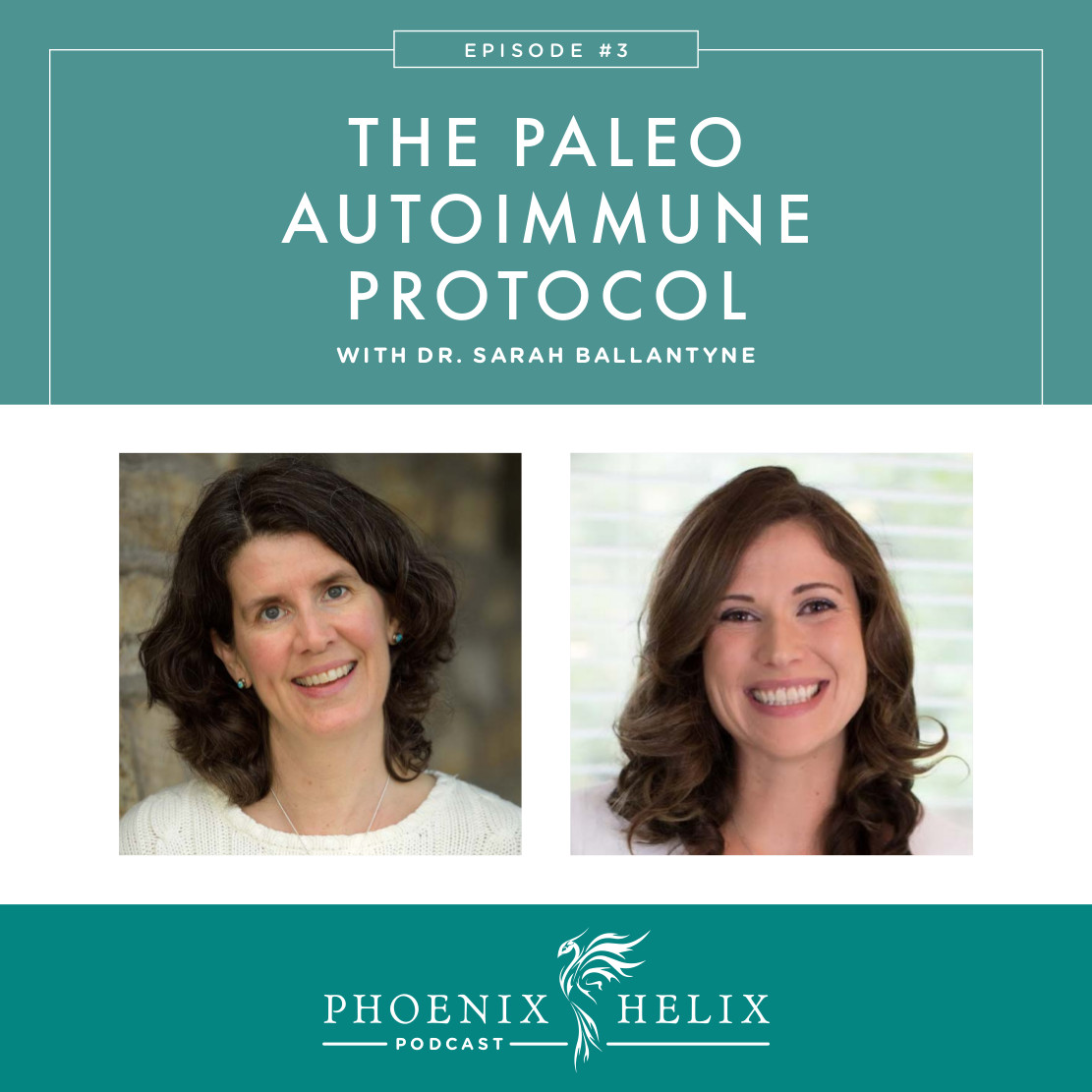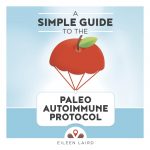The Paleo Autoimmune Protocol
In the first episode of the Phoenix Helix podcast, we shared real-life examples of what reversing autoimmune disease looks like. The second episode delved into all things paleo – what we eat and why – and busted some common nutrition myths.
Today, we discuss the paleo autoimmune protocol. I’m joined be THE expert, Dr. Sarah Ballantyne. She shares her personal healing story, gives an overview of the AIP, and takes a big picture look at the scientific basis for how and why it works. The AIP can be hard, so it’s really helpful to understand the reasoning behind it. Get ready to geek out on some science!
Listen to the Show
- Subscribe to my podcast through your favorite podcast app: iTunes, Stitcher, Google, TuneIn, Spotify, Amazon, etc.
- You can also listen to the episode right here through the player below, and if you subscribe to my newsletter you’ll get notified of future episodes.
Podcast: Play in new window | Download
Show Notes
- Intro (0:00)
- Meet Sarah (0:51)
- She is a research scientist and author of The Paleo Approach and The Paleo Approach Cookbook.
- Co-host of The Paleo View Podcast, and blogger behind The Paleo Mom.
- Her health journey: While a low-carb diet led to a dramatic 100 pound weight loss, her health declined anyway until she was experiencing a vast array of problems: irritable bowel syndrome (IBS), acid reflux, migraines, depression, anxiety, asthma, allergies, eczema, psoriasis and an autoimmune skin condition called lichen planus. She struggled with her health for over a decade before trying the paleo diet. Within 2 weeks, she was medication-free, and over time, she was able to heal all of her health problems. Now, as long as she follows her personalized AIP template, emphasizing lifestyle choices as much as diet, she is symptom-free.
- 3 Pillars of the AIP (28:16)
- (1) The list of foods you remove from your diet, that are potential inflammation triggers.
- (2) The list of nutrient-dense foods you add to your diet, that encourage autoimmune healing.
- (3) The lifestyle measures that have a strong impact on inflammation and the autoimmune response.
- What are Nightshades? (30:45)
- Click the word “nightshades” above, for the main list.
- Hidden in almost every packaged food. If a label says “spices” and doesn’t name them, most of the time it contains nightshades. Paprika is the most commonly used nightshade ingredient, because it adds an appealing pink color to things like deli meats, sauces and rotisserie chickens.
- Truth Talk: The AIP Is Intimidating (36:37)
- You can take it in stages: Regular paleo first, and then AIP only if necessary.
- Our next podcast episode is going to be all about practical implementation: advice to help you succeed, from people who have been following the protocol themselves.
- Understanding the Science Behind the AIP (38:06)
- What is happening in the autoimmune body, and how does that differ from a healthy body?
- The connection between poor gut health and autoimmune disease. 80% of our immune system is housed in the tissues surrounding the gut. Leaky gut and autoimmune disease go hand in hand, and our gut bacteria balance has a direct impact on every aspect of our health.
- Why foods that are okay on paleo are removed from the AIP. People with autoimmune disease have more sensitive systems, and any food that has the potential to be inflammatory to the immune system or irritating to the gut, are removed from the AIP.
- The connection between nutrient deficiency and autoimmune disease. This is why nutrient dense healing foods are an important part of the AIP. They help regulate the immune system, heal damaged tissues (including leaky gut) and restore a healthy bacteria balance.
- The connection between hormone regulation and autoimmune disease, and the impact of lifestyle on hormone balance.
- Sarah read 6,000+ studies during the writing of The Paleo Approach, and 1,200 studies are cited in the book.
- The AIP addresses dysregulation of the immune system, which is the root cause of all autoimmune diseases, and why the AIP works for a wide variety of diagnoses.
- Outro (1:00:55)
- You can keep up with all of Sarah’s work through her blog, The Paleo Mom. There you will find information on her books, podcast, consulting practice, and more.
- Eileen (your podcast host) is the author of multiple books, written to help people thrive with autoimmune disease. Learn more on the Books Page.
- If you like this podcast, follow or subscribe through your favorite podcast app. You can also subscribe to Eileen’s biweekly newsletter.
- Check out the entire archive of podcast episodes.
You May Also Be Interested In
Spreading the Word
If you like the podcast, please leave a positive review in iTunes. It would mean the world to me, and also helps others find the podcast. Here are some quick instructions using your iPhone:
- If you are already subscribed to my podcast: (1) Click the purple podcast icon. (2) At the bottom of the screen, click Library. (3) At the top of the screen, click Shows. (4) Click the Phoenix Helix podcast image. (5) Scroll down the page, and you’ll see Ratings and Reviews. Scroll down a little bit more and click on Write a Review. This will bring up the review screen. Tap 5 stars (if you love the podcast), and then click in the title box, and it will bring up the keyboard. Enter a title and short review. (6) Click Send in the upper right corner. (7) Thank you! Positive reviews give the podcast a higher search ranking in iTunes, helping people find it and letting them know it’s a quality podcast and worth their time to listen.
- If you haven’t subscribed to my podcast: (1) Click the purple podcast icon. (2) In the lower right corner, click the magnifying class. (3) Type Phoenix Helix in the search box. (4) Click the podcast cover in the Show list. (5) If you’d like to subscribe, click the + sign at the top of the screen. (6) To write a review, scroll down the page, and you’ll see Ratings and Reviews. Scroll down a little bit more and click on Write a Review. This will bring up the review screen. Tap 5 stars (if you love the podcast), and then click in the title box, and it will bring up the keyboard. Enter a title and short review. (7) Click Send in the upper right corner. (8) Thank you! Positive reviews give the podcast a higher search ranking in iTunes, helping people find it and letting them know it’s a quality podcast and worth their time to listen.









I haven’t had a chance to listen to the podcast yet, so perhaps this question was addressed within that, but I am looking to purchase one of the Paleo Approach books Sarah has written. I have a daughter who is struggling to recover from Lyme disease. What is the difference between the 2 books…they look rather similar. Thanks for any help!
Good question: The Paleo Approach is a textbook on autoimmune healing, and The Paleo Approach Cookbook is the companion cookbook with 200+ autiommune-friendly recipes.
That helps a lot, thank you! So it sounds as if it is most helpful to buy both books then. We are trying everything we can to help my daughter recover her strength. Thanks!
Definitely buy the first one (the textbook) because it’s full of valuable information. When it comes to the cookbook, there’s also another option: The Autoimmune Paleo Cookbook by Mickey Trescott. Look at them both on Amazon and see which one appeals to you. They’re both excellent. I also wanted to let you know of two blogs your daughter might want to check out. They’re both by people who have lyme disease who are following the paleo diet: True North AIP and Beyond the Bite.
Thanks so much Eileen! That is very kind of you to pass along this additional information to check out. We will do just that!
I have been suffering with numerous autoimmune diseases since my twenties. I am now a week away from turning 65. It has been a struggle and taken a toll mentally, physically and emotionally. I suffer from IBS, Fibromyalgia, Osteoarthritis, Rheumatoid Arthritis and Osteoporosis. I have sinus infections constantly which most often need to be treated with antibiotics. I suffer from anxiety and depression. I started browsing for information on RA because I am now in so much pain. It is the first time that inflammation has been so chronic for months. Usually I would get a reprieve for a few months in between bouts of usually a few weeks. I saw Sarah’s book and bought it. I am now two-thirds through it. I happened to come across a Youtube video series “The Autoimmune Connection” which helped me understand even more about the Paleo Approach.
Thank you for this podcast. I found it informative and I also listened to your first podcast. It can be a bit overwhelming to make all these changes when I have been used to eating a certain way for almost
65 years. I am feeling positive about this lifestyle I am about to embark and nervous too. Again thank you for putting out information for people like me to help us make better choices and decisions in regards to our health.
Hi Ana. Thanks so much for introducing yourself. The next episode of the podcast will cover practical tips for getting started. It can be overwhelming, I agree. We’ve been where you are and totally understand. It’s definitely worth making the changes, though!
Fantastic! I’d love to see the study Sarah mentioned that came out after TPA. I’ll have to start digging…
Thank you for another excellent and informative pod cast.
Thanks for the compliment, Janet! I’m definitely striving for quality.
Outstanding podcast with Sarah Ballantine–thanks so much for covering this topic so in-depth!
My pleasure, Lorraine.
Great podcast!!
Thanks, Allison!
Hi Eileen, thank you for another great podcast! Sarah’s the best. 😉
Just in case you and your readers didn’t hear about it yet, there’s an Autoimmune Summit coming up in November by Dr. Amy Myers with some great speakers: Michael Ash, BSc(Hons) DO ND FDipION, Sarah Ballantyne, PhD, Jeff Bland, PhD, Susan Blum, MD, MPH, David Brady, DC, ND, George Chandy, PhD, Alessio Fasano, MD, Kara Fitzgerald, ND, Leo Galland, MD, Nora Gedgaudas, Sara Gottfried, MD, David Haase, MD, Antony Haynes BA(Hons) DipION, Kathlyn Hendricks, Ph.D., BC-DMT, Richard Horowitz, MD, Mark Hyman, MD, Donna Jackson Nakazawa, Alejandro Junger, MD, Dan Kalish, DC, Datis kharrazian, DC, DABCN, CNS, Chris Kresser, LAc, Todd Lepine, MD, Frank Lipman, MD, Deanna Minich, MS, PhD, CNS, Mike Mutzel, MS(c), Amy Myers, MD – Summit Host, Stuart Nunnally, DDS, Tom O’Bryan, DC, Dan Pardi, David Perlmutter, MD, Robert Rountree, MD, Jeffrey M. Smith, Leslie Stone, MD, IFMCP, Michael Stone, MD, MS, Aristo Vojdani, PhD, Terry Wahls, MD, Heather White, Brianne Williams, RD LD and Robb Wolf. http://autoimmunesummit.com/
What I like most about your blog is that you, like Sarah Ballantyne (as well as many of your commenters’ blogs like Petra/Mickey/’Sidney’) give people hope and ways to live better. Thank you!
I hadn’t heard of the summit. Thanks for sharing, Alex, and I’ll definitely help spread the word.